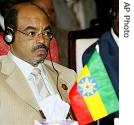-
(单词翻译:双击或拖选)
By Cathy Majtenyi
23 November 2006
In a motion put forth1 to parliament Thursday, Ethiopia's prime minister indicated that his country could use force to defend Ethiopia against Somali Islamists if negotiations2 with them are unsuccessful. Officials of the Islamic Courts Union had earlier declared a jihad, or Holy War, against Ethiopia over the presence of Ethiopian troops in Somalia. Cathy Majtenyi reports for VOA from Nairobi.
-----
Prime Minister Meles Zenawi told the lawmakers that the Islamists who declared Holy War against Ethiopia are a "clear and present danger" to Ethiopia, and that Ethiopians need to be defended against such a threat.

Meles Zenawi (file photo)
Minister of Information Berhane Hailu insists that Meles' comments were not a declaration of war.
"I'm hearing that the prime minister's message is going to be misinterpreted, that the country of Ethiopia has declared war against Somalia," said Hailu. "That is completely wrong. What the prime minister said is that we are trying to solve the problem peacefully. If this option is not successful, the parliament should allow the government to use its legal right to defend the country."
But officials of the Islamic Courts Union, who reportedly met in the capital Mogadishu to discuss the issue shortly after the motion was put forward, say otherwise.
The French news agency, AFP, quoted an Islamic Courts Union spokesman as saying Meles' motion is a threat to regional peace and that Ethiopia was showing what he called "reckless, war-thirsty behavior."
The spokesman was quoted by the French news agency as saying "we are not a threat to Ethiopia, but the presence of its troops in our homeland is a serious security risk to Somalia as well as Ethiopia."
Lawmakers in Ethiopia's parliament ended up rejecting Meles' motion.
Beyene Petros, the head of the opposition4 United Ethiopian Democratic Forces, explains why.
"It's an overreaction, and I do not think the government, and for that matter the Ethiopian military or the armed forces, need any clearance5 to stop whatever intrusion at the border," Petros said.
Beyene says there is no need for the prime minister to give the military advanced permission to ward3 off an attack by the Islamists, as it is the military's job to defend the country against external attack.
Such a motion is dangerous, says Beyene, because it can be interpreted as a declaration of war against the Somali Islamists and it can inflame6 already heated tensions in the region.
The Islamic Courts Union vehemently7 opposes the presence of foreign peacekeepers in Somalia, especially those from neighboring Ethiopia.
After much denial of the presence of Ethiopian troops in Somalia, the Ethiopian government recently admitted the existence of a small number of troops, but only acting8 in a training capacity.
Eyewitnesses9 and other maintain that Ethiopian soldiers are fighting alongside their Somali counterparts.
The Islamic Courts Union first started its expansion back in June, when it took control of the capital Mogadishu. It has since captured much of southern Somalia.
Ever since civil war broke out in 1991, militias10 loyal to clan11 and sub-clan-based factions12 have controlled different parts of the country, with no central authority to provide law and order and even basic services to the population.
A transitional Somali parliament was formed in Kenya more than a year ago following a peace process.
 收听单词发音
收听单词发音
1
forth

|
|
| adv.向前;向外,往外 | |
参考例句: |
|
|
|
2
negotiations

|
|
| 协商( negotiation的名词复数 ); 谈判; 完成(难事); 通过 | |
参考例句: |
|
|
|
3
ward

|
|
| n.守卫,监护,病房,行政区,由监护人或法院保护的人(尤指儿童);vt.守护,躲开 | |
参考例句: |
|
|
|
4
opposition

|
|
| n.反对,敌对 | |
参考例句: |
|
|
|
5
clearance

|
|
| n.净空;许可(证);清算;清除,清理 | |
参考例句: |
|
|
|
6
inflame

|
|
| v.使燃烧;使极度激动;使发炎 | |
参考例句: |
|
|
|
7
vehemently

|
|
| adv. 热烈地 | |
参考例句: |
|
|
|
8
acting

|
|
| n.演戏,行为,假装;adj.代理的,临时的,演出用的 | |
参考例句: |
|
|
|
9
eyewitnesses

|
|
| 目击者( eyewitness的名词复数 ) | |
参考例句: |
|
|
|
10
militias

|
|
| n.民兵组织,民兵( militia的名词复数 ) | |
参考例句: |
|
|
|
11
clan

|
|
| n.氏族,部落,宗族,家族,宗派 | |
参考例句: |
|
|
|
12
factions

|
|
| 组织中的小派别,派系( faction的名词复数 ) | |
参考例句: |
|
|
|















